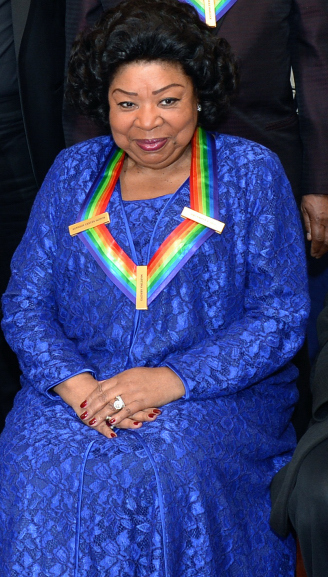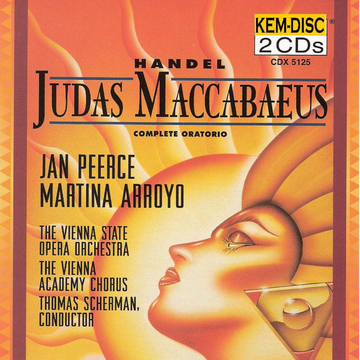
Arroyo, Martina
Martina Arroyo (born February 2, 1937)[1] is an American operatic soprano who had a major international opera career from the 1960s through the 1980s. She was part of the first generation of black opera singers to achieve wide success.
Arroyo first rose to prominence at the Zurich Opera between 1963 and 1965, and then was one of the Metropolitan Opera‘s leading sopranos between 1965 and 1978. During those years at the Metropolitan Opera, she was also a regular presence at the world’s opera houses, performing on the stages of La Scala, Covent Garden, the Opéra National de Paris, the Teatro Colón, the Deutsche Oper Berlin, the Vienna State Opera, the Lyric Opera of Chicago, and the San Francisco Opera. She is best known for her performances of the Italian spinto repertoire, and in particular, her portrayals of Verdi and Puccini heroines. Her last opera performance was in 1991, after which she has devoted her time to teaching singing on the faculties of various universities in the United States and Europe.[2] On December 8, 2013, Arroyo received a Kennedy Center Honor.[3]
Arroyo was born in New York City, the younger of two children of Demetrio Arroyo, originally from Puerto Rico, and Lucille Washington, a native of Charleston, South Carolina. Her older brother grew up to become a Baptist minister. The family lived in Harlem near St. Nicholas Avenue and 111th Street. Her father was a mechanical engineer at the Brooklyn Navy Yard and earned a good salary which enabled Arroyo’s mother to stay at home with their children. His job also allowed the family to experience New York’s cultural offerings and the family frequented museums, concerts, and the theatre. It was attending several performances of Broadway shows during the 1940s that first inspired Arroyo’s interest in becoming a performer. Her mother humored her dreams and allowed Arroyo to take ballet classes. Her mother was also a talented amateur classical pianist and taught her daughter to play the instrument. Arroyo’s other musical experiences as a child were largely through singing in the choirs at her Baptist church and as a student at Hunter College High School.
In 1957 Arroyo auditioned for the Metropolitan Opera but was not accepted. Somewhat disheartened, she flirted with the idea of becoming an academic and began working on a master’s degree in comparative literature at New York University with a dissertation on Ignacio Silone’s Pane e Vino and Vino e Pane. The following year she competed in and won the Metropolitan Opera’s Audition of the Air competition (precursor to its National Council Auditions), earning a $1,000 cash prize and a scholarship to the Met’s Kathryn Long School. She left NYU and entered the Kathryn Long School in the Fall of 1957 where she studied singing, drama, German, English diction, and fencing. While at the school, she was offered the role of the first coryphée in the American premiere of Ildebrando Pizzetti‘s Murder in the Cathedral to be performed at a festival in upstate New York. The concert, however, was rained out and was rescheduled for a performance at Carnegie Hall instead on September 17, 1958. This marked Arroyo’s first professional appearance singing in an opera. The New York Times said of her performance, “Martina Arroyo is a gifted soprano who appears to have remarkable potential, and she sang with a voice of amplitude and lovely color.”[3][2][4]
In February 1959 Arroyo sang the title role in Gluck‘s Iphigénie en Tauride in a concert version with the Little Orchestra Society at Town Hall. Shortly thereafter she made her debut on the opera stage at the Metropolitan Opera as the Celestial Voice in Giuseppe Verdi‘s Don Carlo on March 14, 1959 with Eugenio Fernandi in the title role, Leonie Rysanek as Elizabeth, Robert Merrill as Rodrigo, and Nell Rankin as Princess Eboli. This was the beginning of a long association with the Met and the beginning of a lengthy career on the opera stage.[3][2][4]
Musical career[edit]
After having made her Met debut, Arroyo moved to Europe where she began to appear in roles with minor opera houses in 1959. While performing in Italy of that year she met her future husband, professional violist Emilio Poggioni. The marriage ended in divorce and she later was married to Michel Maurel until his death in 2011.[4] Over the next several years Arroyo worked mostly in Europe in mostly smaller roles, failing to land the larger name-making roles. Those larger parts which she did get were mostly in more obscure works. During 1961 and 1962 she went back and forth between Europe and the Metropolitan Opera frequently, with her roles at the Met during this period being in Richard Wagner‘s The Ring Cycle and in reprises of Don Carlo. Her roles in the Ring included the Third Norn and Woglinde in Götterdämmerung, Woglinde in Das Rheingold, Ortlinde in Die Walküre, and the Forest Bird in Siegfried.[3][2][4]
In 1963 Arroyo’s first major break came when she was offered a contract to join the Zurich Opera as a principal soprano. She made her debut there in the title role of Verdi’s Aida where she was received enthusiastically. She continued to sing regularly at that opera house through 1968.[3][2][4]
Aida became an important role for Arroyo early in her career, serving as a calling card for her at many major opera houses during the 1960s. She sang the role for her first appearance at the Hamburg State Opera in 1963 and at both the Deutsche Oper Berlin and the Vienna State Opera in 1964. In February of the following year she sang Aida in her first starring role at the Met as a last minute replacement for Birgit Nilsson. The performance received rave reviews with The New York Times praising Arroyo as “one of the most gorgeous voices before the public today.” Rudolf Bing, the Met’s director, immediately offered her a contract to join the roster of the company’s principal sopranos which extended for several years.[3][2][4]
Arroyo began the 1965/66 season at the Met in October with a critically acclaimed performance of Elizabeth in Don Carlo. She immediately became a favorite singer at that house portraying mostly Verdi heroines and the Met became her principal home from that point up until 1978. Her other roles at the Met during these thirteen years included Aida, Amelia in Verdi’s Un ballo in maschera, Cio-Cio-San in Giacomo Puccini‘s Madama Butterfly, Donna Anna in Mozart‘s Don Giovanni, Elvira in Verdi’s Ernani, Lady Macbeth in Verdi’s Macbeth, Leonora in Verdi’s Il trovatore, Leonora in Verdi’s La forza del destino, Liù in Puccini’s Turandot, Maddalena in Umberto Giordano‘s Andrea Chénier, Santuzza in Pietro Mascagni‘s Cavalleria rusticana, and the title role in Amilcare Ponchielli‘s La Gioconda among others. She was also notably the first black person to portray the role of Elsa in Wagner’s Lohengrin in 1968, not just at the Met, but in all of opera history.
During her years at the Met, Arroyo would frequently travel to perform at other houses both in the United States and internationally. In 1968 she sang for the first time in Israel and made her first appearance in the United Kingdom as Valentine in a London concert performance of Meyerbeer‘s Les Huguenots. Later that year she made her debut at the Royal Opera at Covent Garden and the Philadelphia Lyric Opera Company, both singing the role of Aida. She returned to both companies a number of times during the 1970s as Verdi heroines and in parts like the title roles in Puccini’s Tosca and Richard Strauss‘s Ariadne auf Naxos. She sang Amelia in Un ballo in maschera for her debuts with both the San Francisco Opera (1971) and the Lyric Opera of Chicago (1972). She returned to Chicago to sing her first Amelia Grimaldi in Verdi’s Simon Boccanegra in 1974. In 1972 she sang Aida for her debut at La Scala opposite Plácido Domingo as Radames. In 1973 she made her first appearances at the Opéra National de Paris and the Teatro Colón in Buenos Aires. In 1977 she made her debut with the Opera Company of Philadelphia portraying Senta in Wagner’s The Flying Dutchman and in 1979 made her debut with Michigan Opera Theatre as Lenora in Il trovatore. She remained very busy in the world’s major opera houses through 1979 singing mostly Verdi, Puccini, and Strauss heroines and other roles from the lirico-spinto repertoire. Arroyo portrayed herself in an episode of The Odd Couple titled “Your Mother Wears Army Boots”, which originally aired on January 16, 1975. The episode also featured Howard Cosell who is portrayed to be a big fan of hers.[3][2][4]
By 1980, Arroyo’s career had started to slow down and she was much more selective in what roles she chose to take. She returned to the Met in 1983 to sing “Fu la sorte” from Verdi’s Aida (with Mignon Dunn) for the company’s Centennial Gala. She returned to sing Aida and Santuzza; making her last appearance and 199th performance at that house on October 31, 1986. In 1987 she sang her last portrayal of the title role in Turandot with the Seattle Opera and in 1989 she announced her retirement from the opera stage. She came out of retirement in 1991 for one last performance in the world premiere of Leslie Adams‘s Blake, an opera whose story is set in pre-Civil War America when slavery was still a reality.[3][2][4]
Throughout her career Arroyo was also a frequent performer of the concert repertoire and appeared with many of the world’s leading symphony orchestras. She performed often with the New York Philharmonic under conductor Leonard Bernstein who particularly admired her voice in such repertoire as Beethoven’s Symphony No. 9 and Missa Solemnis.
Arroyo’s talents also extended beyond the concert stage into the realm of live network television. In 1964 she appeared with the CBS Symphony Orchestra under the conductor Alfredo Antonini in the episode “Feliz Borinquen” of the CBS Repertoire Workshop as herself.[3][2][4]
Martina Arroyo is a recipient of a 2010 Opera Honors Award from the National Endowment for the Arts
